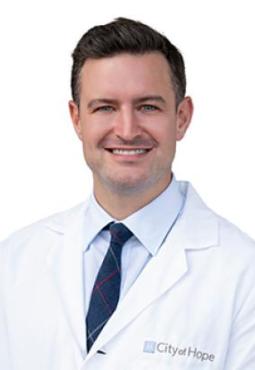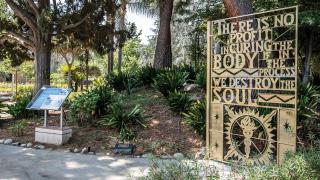Ask oncologist Adam Rock, M.D., why he became a physician, and the answer could be summed up in one word — people.
He joined City of Hope’s lung cancer and thoracic oncology team in September to provide patients with the most advanced treatments available — but his personal connection to them is of equal importance.
“City of Hope is at the forefront of innovation,” he said. “But I also value the relationships I have with patients, so that they know someone’s in their corner helping them through a difficult time.”
These are twin passions he’s had since he was a child in Grosse Pointe, Michigan, where his mother was a nurse and his father a neurosurgeon.

“I saw how meaningful their work was to people and how these relationships often went beyond the workplace,” Rock said. “My father often had patients in pretty dire situations, and years later, they’d still be in touch. Or sometimes we’d run into a patient, maybe at a Red Wings game, and I could see how appreciative they always were when they saw us.”
He observed and admired this quality in certain doctors at every stage of his medical training, which ultimately impacted his decision to specialize in oncology.
“The relationships oncologists have with their patients is so unique,” he said. “I was working with really thoughtful and compassionate doctors, and when I saw how they related to patients and their families, I knew that’s what I wanted to do.”
He also finds that the human element is very much a part of the culture at City of Hope.
“It feels like a more personal campus. From the person who greets you at the parking structure to the chair of the medical oncology department, Dr. [Ravi] Salgia, everyone is very warm, and you can feel that right away,” he said.
Clarity, Honesty and Confidence in Your Colleagues
Rock also feels it’s important to be clear and honest with patients — a value he adopted early in his career when, as an intern, he met a patient with lung cancer that had spread to her brain.
“As a lowly intern, I didn’t have any expertise in managing her disease, but I did realize that you could have a really positive impact just by explaining things in an honest and detailed way,” he said. “This patient was particularly appreciative because she hadn’t been clear about where things were at. Once her diagnosis and treatment options were clearly laid out, she felt she could finally make the best decisions for herself.”
This emphasis on clear communication also extends to how medicine is practiced at City of Hope, which he observed during his fellowship at Harbor UCLA Medical Center, which included a stint at the Duarte campus.
“One of the things that really impressed me was the way you collaborate with experts from other specialties in your department,” he said. “This also means that if I send a patient to a surgeon, for example, they’re going to be getting the best possible care they can get — and I know that physician and will be able to talk personally about the case. And that is really important.”
Beyond that, he’s excited about the research and the clinical trials available to patients at City of Hope.
Groundbreaking Advances in Lung Cancer Care
Lung cancer treatment based on molecular medicine is a giant leap forward from how the disease was treated even just a few years ago.
Take, for example, that lung cancer patient Rock saw when he was an intern. She survived for about a year after she left the hospital — but had she been a patient today, her story might have had a happier ending.
“At that time, the treatment was basically a combination of chemotherapy and radiation for symptom management, but now we’d be looking at a personalized treatment based on molecular genetic alterations, as well as biomarkers that can indicate a patient’s response to immune treatments,” he said.
Molecular analysis can reveal genetic mutations that may drive a patient’s lung cancer to grow, opening the door to the most advanced targeted therapies and immunotherapies. Unlike chemotherapy, which affects both healthy and malignant cells, these new treatments specifically target cancer cells. This means that they are not only highly effective, but also tend to have fewer side effects.
“There are so many options now for patients, not only in terms of the most effective treatment, but also — for patients who are ambivalent about a particular type of treatment or certain side effects — there are now more options available,” Rock said.
City of Hope has recently published Lung Cancer: A Guide to Hope to provide more detailed information about this new frontier in treatment.
And on a Personal Note
At one point in his life, Rock had to decide between two possible careers, and his patients are grateful that he chose medicine. But the road not taken? Well, this Michigan boy aspired to become a pro hockey player.
“More mature minds prevailed,” he said. “But I grew up playing a lot of hockey. And I’m still a big, big hockey player. Even here in L.A., I play twice a week at ice rinks in Torrance and Anaheim.”
He’s also an amateur gardener, growing fruit trees and vegetables in his yard, and at Harbor UCLA, he created a community garden right outside the fellowship office.
But wait, as they say, there’s more.
There’s yet another important role Rock will soon be taking on, that of husband, with a big wedding planned for this coming April.
